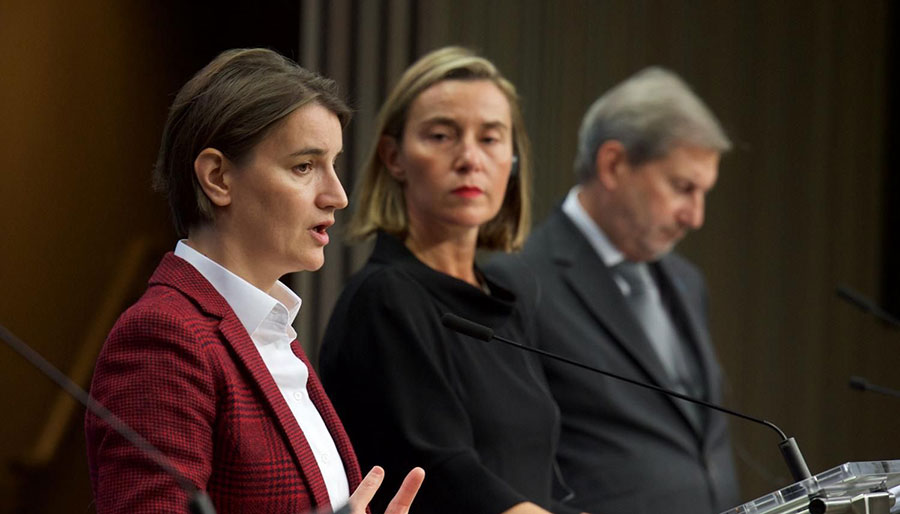The fourth EU-Serbia Stabilisation and Association Council (SA Council) reviewed the state of relations between the EU and Serbia, including Serbia’s progress in the preparations for membership.
- The EU-Serbia Stabilisation and Association Council (SA Council) held its fourth meeting on 16 November 2017. This meeting was chaired by Ms Federica Mogherini, EU High Representative for Foreign Affairs and Security Policy. Ms Ana Brnabic, Prime Minister of Serbia, led the Serbian delegation. Mr Johannes Hahn, Commissioner for European Neighbourhood Policy and Enlargement Negotiations, represented the European Commission.
- The SA Council meeting provided a timely opportunity to review Serbia’s progress in its preparations for accession and to consider priorities for further work within the framework of the Stabilisation and Association Agreement.
- The SA Council reiterated its commitment to Serbia’s European perspective, for which public support should be enhanced through improved and calibrated communication about the benefits and obligations of enlargement.
- It welcomed Serbia’s commitment to regional cooperation, the steps taken by Serbia to implement its action plans for the rule of law chapters 23 and 24 and Serbia’s progress in the EU-facilitated dialogue between Belgrade and Pristina, which allowed the opening of a number of negotiating chapters since the last SA Council, bringing the total number of chapters opened to ten, two of which have been provisionally closed.
- The SA Council encouraged Serbia to intensify reform efforts and to focus on effective implementation and monitoring of reforms in the areas of rule of law, fundamental rights, independence of democratic institutions, public administration, as well as in developing a functioning market economy and improving the business environment. The SA Council reiterated the importance for Serbia to meet in a timely manner the commitments taken in its action plans for chapters 23 and 24.
- The SA Council took note of the holding of the Presidential election in Serbia on 2 April 2017 and looked forward to continued work towards Serbia’s strategic goal of EU membership under the new government. The SA Council also noted that, according to the OSCE’s office for democratic institutions and human rights (OSCE/ODIHR), the election provided voters with a genuine choice of candidates, who were able to campaign freely, and that the legal framework is conducive to the conduct of democratic elections. The SA Council expressed its expectation for Serbia to address all OSCE/ODIHR recommendations.
- As regards the EU-facilitated dialogue, the SA Council underlined the need for Belgrade and Pristina to work together on a new phase of the EU-facilitated dialogue towards comprehensive normalisation. All dialogue agreements already agreed need to be fully implemented without any further delay. The SA Council took positive note of the recently initiated internal dialogue on Kosovo* and expected that it will lead to progress in the normalisation process.
- The SA Council welcomed Serbia’s participation in Common Security and Defence Policy missions and operations, and in the roster of the EU battle groups. The SA Council reiterated its call on Serbia to progressively align with the EU’s Common Foreign and Security Policy in the period up to accession. The SA Council reiterated its call on Serbia to bring to a successful conclusion the review of its 2009 national security and defence strategies as a matter of priority.
- The SA Council commended Serbia for its efforts in addressing the migration and refugee crisis and welcomed Serbia’s determination to fight terrorism and radicalisation.
- The SA Council recalled that regional cooperation and good neighbourly relations were essential parts of the enlargement and Stabilisation and Association processes, and contribute to stability, reconciliation and a climate conducive to addressing open bilateral issues and the legacies of the past. The SA Council noted with satisfaction Serbia’s constructive engagement in a number of regional cooperation initiatives in South-East Europe and encouraged Serbia to continue sustained efforts to strengthen good neighbourly relations.
- The SA Council looked forward to the next steps in accession negotiations and recalled that Serbia’s progress under rule of law chapters 23 and 24 and in the process of normalisation of relations with Kosovo under chapter 35 remained essential for the overall pace of the negotiating process, in line with the negotiating framework.
- The SA Council also held an exchange of views on developments in the Western Balkans.
* This designation is without prejudice to positions on status, and is in line with UNSCR 1244/99 and the ICJ Opinion on the Kosovo declaration of independence.




